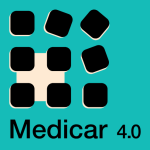SAFE AI ENGINEERING
AI engineering ensures safety of AI components for autonomous, connected driving
Start: 09/2023
Ende: 08/2026
How can automated cargo systems be efficiently controlled in hospitals? In the MediCar 4.0 project, the basis for this challenge is being created, comprising e-vehicles, handling robotics, technical infrastructure components, and software systems, which will be tested on-site in hospitals.
Hospitals in Germany are currently facing comprehensive economic, personnel, and medical challenges. These make fundamental structural changes in a wide variety of areas inevitable. One opportunity arising from this situation is the stronger use of automation and digitalization approaches to make processes more efficient in the long term and relieve the burden on staff. This applies in particular to the transport and logistics processes that support medical care, right up to the door of the patient’s room.
Unlike manufacturing companies, hospitals have so far only been able to implement machine automation solutions and the “intelligent” digitalization of processes on a selective basis. Successful machine automation in hospital operations requires, for example, an enormous degree of functional assurance for productive usability, which usually only goes as far as the hospital threshold. The research and testing of technological innovations for the “intelligent” integration of transport within the complex hospital system and with external parties through fully integrated automation and digital support of transport processes are currently impossible to achieve for individual hospitals.
To promote the automation of transport processes in hospitals, MediCar 4.0 aims to create a basis for automated cargo concepts that include e-vehicles, handling robotics, technical infrastructure components, and software systems, which will be tested on site in hospitals.
In this project, the FZI is investigating how automated cargo systems can be efficiently controlled in hospitals. Dynamic procedures for coordinating transport orders are being developed that can be adapted to various applications, such as laboratory logistics. Logistics simulation is used to evaluate the control and design of the cargo system, determine any necessary adjustments, and implement these. The procedures developed can be used to analyze and evaluate new concepts for networked transport logistics in hospitals in order to design fully sustainable processes.
Intelligente Lösungen für den Transport von Menschen und Gütern für die Mobilität der Zukunft stellen einen Schwerpunkt der FZI-Forschung dar. Dazu entwickelt das FZI integrierte Mobilitätssysteme – von der Fahrzeugautomatisierung über die Anwendung von KI in Verkehrssystemen bis zur urbanen Mobilität und Logistik.

Funding information:
The MediCar 4.0 project is funded by the German Federal Ministry of Research, Technology and Space.
Consortium management:
Consortium partners:
AI engineering ensures safety of AI components for autonomous, connected driving
Data trustee model protects use of individual health data in research
AI-based software detects and corrects motion artifacts in OCT images.
Thanks to the measurement of social interaction, psychological stress caused by loneliness can be detected at an earlier stage
Digital platform for dementia prevention helps address the lack of exercise
More exercise in everyday life: Self-learning real-time system recognizes behavior patterns and recommends customized activities
AI assistant serves as first point of contact for legal questions
AI engineering empowering security reasoning throughout the entire lifecycle of an AI function
Secure and self-determined digital identities in e-commerce
Co-design for application-specific microelectronics with innovative chiplets in Baden-Württemberg